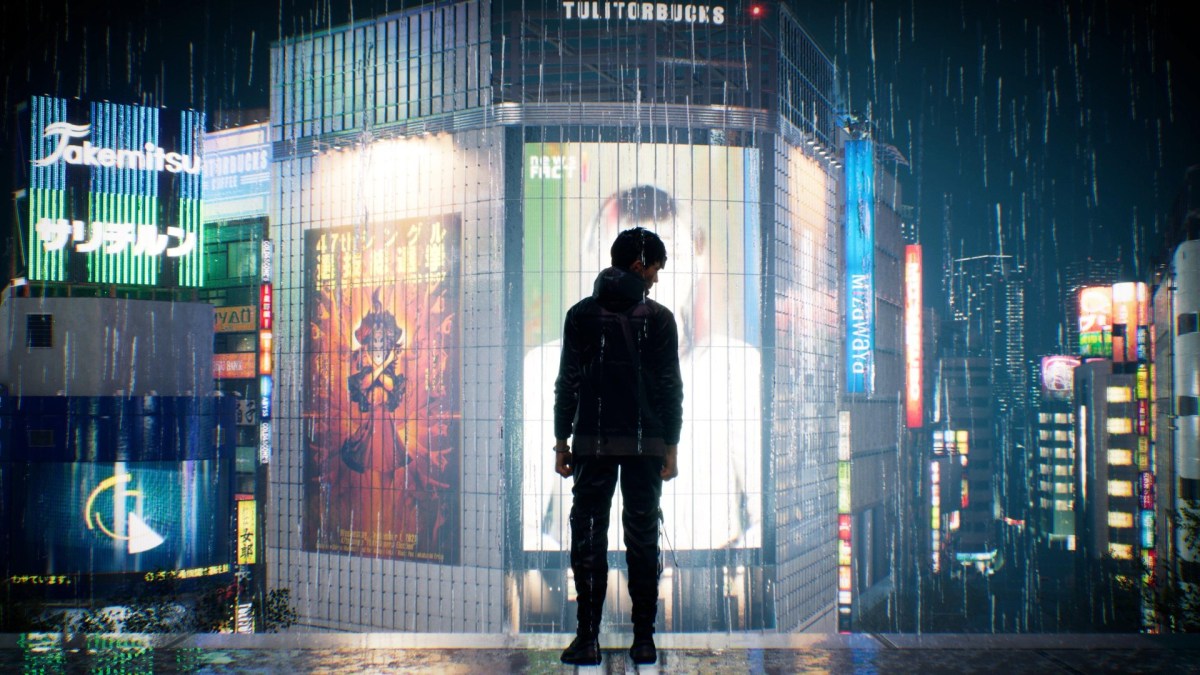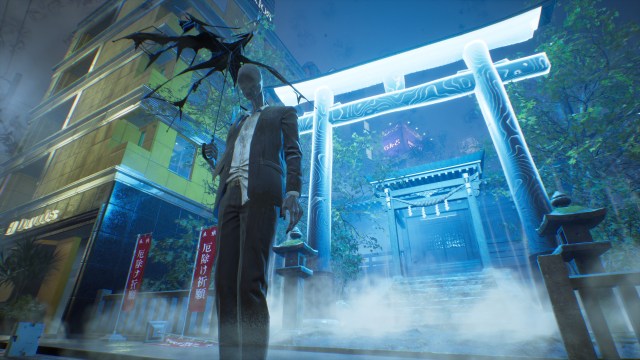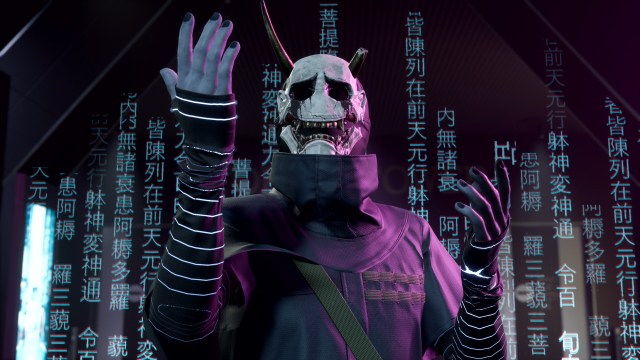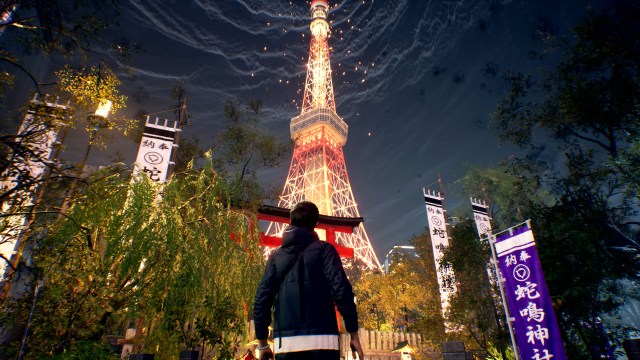Interview: Exploring the Sounds of Ghostwire Tokyo With Composer Masatoshi Yanagi and Director Kenji Kimura
Ghostwire: Tokyo was one of the most intriguing games lined up for early 2022. Tango Gameworks’ follow-up to the Evil Within series (and new IP) has a unique vibe and some incredible visuals. Even though it didn’t end up being my favorite game this year, there was certainly a lot worth thinking about. Especially the […]

Ghostwire: Tokyo was one of the most intriguing games lined up for early 2022. Tango Gameworks’ follow-up to the Evil Within series (and new IP) has a unique vibe and some incredible visuals. Even though it didn’t end up being my favorite game this year, there was certainly a lot worth thinking about. Especially the game’s sound design, which was very complex especially compared to many other AAA games.
I was offered a chance to interview Masatoshi Yanagi, the composer on Ghostwire: Tokyo. As an added bonus, game director Kenji Kimura was also present to join in a bit. I got some interesting answers to what I hoped were interesting questions; at least as far as I’m concerned, I learned a bit about how a composer goes about their daily work. You can check out the interview below, which was held over a Zoom call and edited for clarity and readability.
Ghostwire: Tokyo Sound Design Interview: Composer Masatoshi Yanagi and Game Director Kenji Kamura

Lucas White, Prima Games: Can you talk to me about the overall themes of Ghostwire Tokyo? What they are and how those themes are reflected in the music and sound design.
Masatoshi Yanagi, Composer: The game utilizes themes of Japanese tradition and history, and the way Japanese culture mixes modernity with tradition. On the music side we wanted to express the same vision so we utilized Japanese traditional instruments, but on the modern side of things we use computer synthesized sounds. We also took recording samples of noises from the city itself, mixed in all of the sounds and blended them together to create the overall sound design.
Was the music composed alongside developing the story and the look and mood of the game or were you composing music based on information, but not creative work that had already been built?
Related: Ghostwire: Tokyo Review: Neighborhood Yokai Watch
Yanagi: Mostly the graphic side had a headstart. So I was able to kind of look on-screen, what kind of assets we had in the creation of the models for Tokyo to get inspiration from the visuals to create the music. In regards to the storyline, that was still kind of text-based and constantly being iterated on. So I’d read what’s going on in the storyline, try to think about what parts are pretty concrete enough for me to utilize as part of inspiration for music.
3D audio, especially for the PS5 version, has been a big part of communication for Ghostwire. So I’m wondering if that’s something that happens as the music is being created, or if it’s more of like an engineered or programmatic feature. Or just like, what is the 3D audio experience like?
Yanagi: When we talk about 3D audio, this game tends to be more about sound effects and the ambient sounds that we have created. So that you feel like you’re actually in, you know, the city. And you’re in this field, where you’re able to hear things that are 360 degrees up and down, left and right, behind you and in front of you. So these things would be triggered, and actually heard as if, things are occurring in a real life location. On the music side, we wanted to make sure the music didn’t obstruct any of that, because it was a big part of the sensation. Immersion was a big keyword for the game; we wanted the player to feel like they’re actually inside the Tokyo we created. And so we needed to maintain the music volume levels at a level where it did not obstruct that 3D audio so the player can feel like he or she is actually inside the city.

As I’ve been playing the game, I noticed the music versus the sound effects versus the diegetic noise, were all very different from each other. In a way where it was like you could almost see the lines dividing them. The Tengu screaming at you from the buildings, fighting, other noises – they’re all very loud and sudden, harsh. And then the music is often very quiet and it’s ominous but it’s also calm. It rarely gets intense except for when it really needs to. Then the diegetic music from the shops is very full of energy and life: like there’s people speaking in advertisements, or singing in music playing from speakers. Is there was something to that or it just sort of happens when you’re making a videogame? That was a lot for one question, my bad!
That is correct. The overall experience for the sound design is different for the combat situations where it’s much louder and kind of abrupt and you need to be aware of what’s coming at you. That sense of attention is something that’s been applied to the sound design. When you’re in more of an exploration part of the game where you’re walking around, you want to make sure the player feels a little bit more upbeat and wanting to explore more of the city. And so there are sounds that were deliberately chosen to help encourage that. Also if you enter a building and hear announcements from the building, it does give you the sense that you’re just a tourist going sightseeing. So we did want to kind of make a different feel for you know, those different situations in the game. And that’s it’s great that you picked up on what you mentioned.
It’s almost more eerie that way. The fact that Tokyo is completely empty for the most part and the only the only other human voices you hear are in advertisements trying to sell things to people who aren’t there. I think that’s kind of what got me on that train of thought. Is there something to that or is it like you said – the tourism aspect? Maybe that’s an accidental bonus.
We didn’t notice that so that probably happened just by circumstance. We did want to make the city feel and sound like there’s nobody there. Even if we took sample sounds of the city we would have remove the sound of steps. But it is interesting that you mentioned the human voices you hear are trying to sell you stuff, but there’s no humans there and that is eerie. A question we had was, it might be a very Japanese thing because you constantly hear voices of commercials and stuff; people trying to sell you stuff in the city. Does that happen where you live?
Well… no, I live in the American South so it’s really just, like, cows and grass.
[They laughed at my joke, readers. I swear.]

Videogame music often needs things like really short tracks versus longer ones, or music that has to repeat over and over. Something the player is going to hear again and again. Or multiple tracks that are very similar but slightly different based on a situation. Creatively, it is a challenge when you’re composing to have to make music for so many different bits and pieces?
Yanagi: For example, if there’s a situation in the game where the player is doing something we weren’t intending them to do, and that player ends up repeating doing that, then the same track would get played again. And again and again, for that specific situation. There are a lot of tricks I have to use, in regards to lowering the strength of the melody, so that even if the song is the same, it doesn’t stay in your ears long enough to make it it feel like you’ve heard it over and over again. So yeah, there are a lot of things I need to be careful of when I craft some of these songs. And yes, that’s a lot of work. But it’s worth it. Because it’s about creating a really fun experience that may take a little longer for some people than others. We all want to always be mindful of those users too.
Another thing though, as you mentioned, there are times where we have to create one song, but since it would be used in different situations, I’d have to go back to creating the same song, but a different version of it. And that would happen multiple times for the same song. It wouldn’t be like I just create one song and then create another version once. It would be like many, many times and so yeah, that’s a definitely a part of the challenge of making music for a videogame.
Something else I noticed while playing the game that was most striking after just completing the first chapter. Music tracks as unlockables feel more prominent here than most other games. I don’t think I’ve ever seen a music track as part of something like the chapter completion screen. Can you talk about that feature? Any particular motivations behind it or just for fun?
Yanagi: It’s great that you picked up on that. I created a lot of songs for Ghostwire Tokyo; This project was quite extensive for a while. It was in development for a pretty long time. So I was able to create a lot of songs and in a sense, we already had a music player functionality in the game. I wanted to make the music available for players to actually hear and actually choose to use them while walking around in the city. And so we saw an opportunity to use those songs as a part of a reward for completion

Kenji Kimura, Game Director: I really love the music that Yanagi created and really love the sounds that the sound team had created too. We wanted to allow the player to be able to pick and choose the songs that that they wanted to hear. If they heard a song or a track that they liked during the gameplay that they wanted to hear again, we wanted to allow that player to be able to do that. So we offered that as part of the reward for completion.
What is the relationship like, between the game director and composer? What’s the workflow like or the feedback loop? Just how those two positions interact.
Kimura: Personally, I love music, I love listening to different types of music. When I needed to have some music created for the game, I felt that it would be a little impolite if I came to the sound design team or the composer and said, hey, I really like this specific song, can you make something like this? I didn’t want to do that. I wanted to respect the creativity of our team. And so, I didn’t want to bring like, an example of something that I liked. Because I thought by doing that, it might limit the creativity, what the composer wanted to create.
So we’d have a lot of chats, basically, we talk a lot, a lot about different things and within daily conversations, just water cooler talk like what do you have for lunch, little chit chats like that led into different kinds of kinds of conversations that would lead into explanations of what’s going on with the game, what’s being created. And think over a series of those small chats the team members would kind of pick up on the vibes, that we’re kind of going after, the feelings that we’re trying to spark into the player. Through those natural conversations, the composer would be able to kind of pick up on some key words and, and try to use those as pieces of inspiration to start creating music. I’m also at a similar age as Yanagi.
So it also helped, because we probably been exposed to the same kind of entertainment growing up, and we had a lot of things that we could relate to by saying a couple of words to each other. And so that probably has helped the process significantly, too.
That was a lot of talking for only a half hour interview, but I hope it was a good read! As always we thank our interview subjects for their time, so a big thanks to Mr. Yanagi and Mr. Kimura. An additional thanks to Ghostwire: Tokyo’s PR team is warranted as well, for reaching out in the first place, working with me on the topic and access to the soundtrack! And of course to our translator from Bethesda, who probably had a terrible time translating my southern drawl into Japanese. Yeehaw.
